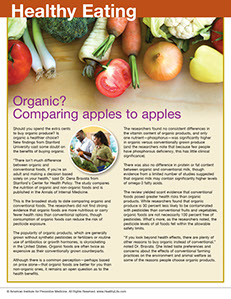SYMPTOM CHECKER
CONDITIONS
Male
Female
Child
Arm, Hand & Shoulder Concerns
Legs & Feet Concerns
Dental & Mouth Concerns
Ear & Nose
Eye Conditions
Head Conditions
Arm, Hand & Shoulder Concerns
Legs & Feet Concerns
Front
Back
Arm, Hand & Shoulder Concerns
Dental & Mouth Concerns
Ear & Nose
Eye Conditions
Head Conditions
Arm, Hand & Shoulder Concerns
Dental & Mouth Concerns
Ear & Nose
Eye Conditions
Head Conditions
Front
Back
Arm, Hand & Shoulder Concerns
Neck Links
Head & Neck Concerns
Arm, Hand & Shoulder Concerns
Neck Links
Head & Neck Concerns
Front
Back
Online Clinic
Wise Healthcare
Organic? Comparing apples to apples
Print on Demand
Should you spend the extra cents to buy organic produce? Is organic a healthier choice? New findings from Stanford University cast some doubt on the benefits of buying organic.
“There isn’t much difference between organic and conventional foods, if you’re an adult and making a decision based solely on your health,” said Dr. Dena Bravata from Stanford’s Center for Health Policy. The study compares the nutrition of organic and non-organic foods and is published in the Annals of Internal Medicine.
This is the broadest study to date comparing organic and conventional foods. The researchers did not find strong evidence that organic foods are more nutritious or carry fewer health risks than conventional options, though consumption of organic foods can reduce the risk of pesticide exposure.
The popularity of organic products, which are generally grown without synthetic pesticides or fertilizers or routine use of antibiotics or growth hormones, is skyrocketing in the United States. Organic foods are often twice as expensive as their conventionally grown counterparts.
Although there is a common perception—perhaps based on price alone—that organic foods are better for you than non-organic ones, it remains an open question as to the health benefits.
The researchers found no consistent differences in the vitamin content of organic products, and only one nutrient—phosphorus—was significantly higher in organic versus conventionally grown produce (and the researchers note that because few people have phosphorous deficiency, this has little clinical significance).
There was also no difference in protein or fat content between organic and conventional milk, though evidence from a limited number of studies suggested that organic milk may contain significantly higher levels of omega-3 fatty acids.
The review yielded scant evidence that conventional foods posed greater health risks than organic products. While researchers found that organic produce is 30 percent less likely to be contaminated with pesticides than conventional fruits and vegetables, organic foods are not necessarily 100 percent free of pesticides. What’s more, as the researchers noted, the pesticide levels of all foods fell within the allowable safety limits.
“If you look beyond health effects, there are plenty of other reasons to buy organic instead of conventional,” noted Dr. Bravata. She listed taste preferences and concerns about the effects of conventional farming practices on the environment and animal welfare as some of the reasons people choose organic products.
This website is not meant to substitute for expert medical advice or treatment. Follow your doctor’s or health care provider’s advice if it differs from what is given in this guide.
The American Institute for Preventive Medicine (AIPM) is not responsible for the availability or content of external sites, nor does AIPM endorse them. Also, it is the responsibility of the user to examine the copyright and licensing restrictions of external pages and to secure all necessary permission.
The content on this website is proprietary. You may not modify, copy, reproduce, republish, upload, post, transmit, or distribute, in any manner, the material on the website without the written permission of AIPM.
2021 © American Institute for Preventive Medicine - All Rights Reserved. Disclaimer | www.HealthyLife.com
















































